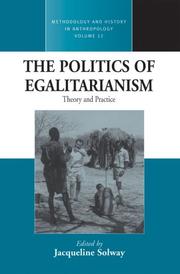| Listing 1 - 3 of 3 |
Sort by
|

ISBN: 9781845451158 9781845451141 1845451155 1845451147 1782388850 Year: 2006 Volume: 12 Publisher: New York, [New York] ; Oxford, [England] : Berghahn Books,
Abstract | Keywords | Export | Availability | Bookmark
 Loading...
Loading...Choose an application
- Reference Manager
- EndNote
- RefWorks (Direct export to RefWorks)
The essays assembled in this book exemplify the way political anthropologists address a range of problems that deeply affect people throughout the world. The authors draw their inspiration from the work of Canadian anthropologist Richard B. Lee, and, like him, they are concerned with understanding and acting upon issues of “indigenous rights”; the impact of colonialism, postcolonial state formation, and neoliberalism on local communities and cultures; the process of culture change; what the history and politics of egalitarian societies reveal about issues of “human nature” or “social evolution”; and how peoples in southern Africa are affected by and responding to the most recent crisis in their midst, the spread of AIDS. The authors in this volume discuss the state of a range of contemporary debates in the field that in various ways extend the political, theoretical, and empirical issues that have animated Lee's work. In addition, the book provides readers with important contemporary Kalahari studies, as well as “classic” works on foraging societies.
Indigenous peoples --- San (African people) --- Autochtones --- San (Peuple d'Afrique) --- Civil rights. --- Government relations. --- Social conditions. --- Colonization. --- Droits --- Relations avec l'Etat --- Conditions sociales --- Colonisation --- Lee, Richard B. --- Basarwa (African people) --- Bushmen --- Bushmen (African people) --- /Xam (African people) --- Ethnology --- Khoisan (African people) --- Government relations with indigenous peoples --- Indigenous rights --- Native rights --- Civil rights --- Lee, Richard, --- Lee, Richard Borshay
Book
ISBN: 0253030196 9780253030191 9780253029737 0253029732 9780253030009 0253030005 Year: 2017 Publisher: Bloomington, Indiana, USA
Abstract | Keywords | Export | Availability | Bookmark
 Loading...
Loading...Choose an application
- Reference Manager
- EndNote
- RefWorks (Direct export to RefWorks)
Over the past decade, complaints about an inability to achieve adulthood have rung out around the world. Young people across the globe, burdened with debt and unsatisfactory job prospects, are struggling to establish households, marry, and, perhaps most significantly, "feel" grown up. For them, achievement of adulthood has become increasingly elusive. Elusive Adulthoods poses the question "What is adulthood?" and examines how the field of anthropology has come to overlook this meaningful life transition. Through diverse case studies, contributors explore a variety of means by which adulthood can be recognized, such as negotiated relationships with others and as a form of upward class mobility. Contributors also grapple with the difficulties that come from a sense of having missed full adulthood - perhaps due to rapid social change or reluctance to embrace the necessary subordination to job and family. In each case, changing political and economic factors form the background for generational experiences and understandings of what it means to reach adulthood as globalization dictates changes to traditional rites of passage. -- from back cover.
Young adults --- Adulthood --- Maturation (Psychology) --- Economic conditions --- Social conditions --- 2000-2099
Book

ISBN: 9781782388852 Year: 2006 Publisher: New York Oxford
Abstract | Keywords | Export | Availability | Bookmark
 Loading...
Loading...Choose an application
- Reference Manager
- EndNote
- RefWorks (Direct export to RefWorks)
| Listing 1 - 3 of 3 |
Sort by
|

 Search
Search Feedback
Feedback About UniCat
About UniCat  Help
Help News
News